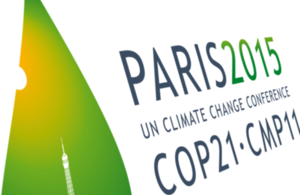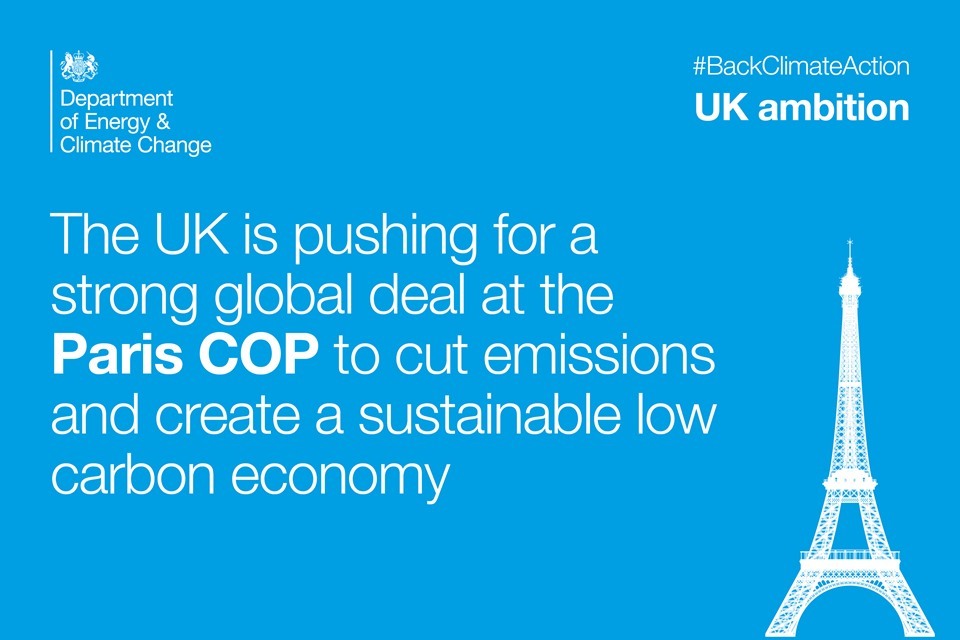Paris climate talks explained
COP21: A quick guide to the UN Climate Change Conference in Paris

Paris COP21 symbol
Climate change is one of the most serious threats facing our world. It is not just a threat to the environment. It is also a threat to national and global security, poverty eradication and economic prosperity.
Find out more about climate change
A global agreement is the only way we can deliver the scale of action required to reduce global emissions. Securing an ambitious global climate deal in Paris is a UK Government priority and we are working with other countries to push political ambition.
What is the Paris Conference?
The 21st UNFCCC (UN Framework Convention on Climate Change) Conference of Parties* (COP21) will be held in Paris from 30 November until 11 December and its aim is to agree the first truly global agreement to tackle climate change.
Who is attending?
Over two weeks, around 130 Leaders (including the Prime Minister), environment Ministers and Government officials will be in attendance, as well as a wide range of representatives from civil society and business. Secretary of State for the Department of Energy and Climate Change, Rt Hon Amber Rudd will lead the UK delegation.
What are the prospects for a deal?
The UK government is cautiously optimistic and is working hard with other countries to resolve outstanding issues, but it will be a challenging negotiation.
Over 160 countries, covering 90% of global emissions and representing over 90% of the global economy have come forward with their proposed national commitments to reduce emissions (known in the UN as Intended Nationally Determined Contributions, or INDCs).
These are unprecedented and a significant move forward from business as usual.
What are we looking for in the Paris deal?

DECC Paris COP21 - UK ambition
The UK and EU (who lead on climate negotiations on behalf of EU member states) are pushing for:
- Ambitious mitigation commitments from all Parties (developed and developing), and a plan to implement them;
- A mechanism to review mitigation ambition every five years to bring Parties back to the table to further reduce emissions in line with a long term goal to keep the world moving towards the below 2°C goal;
- A robust, legally-binding rules framework to ensure transparency and accountability around climate action and to help track progress; and
- Climate finance to support the poorest and most vulnerable countries to take action to mitigate and adapt to climate change.
How is the UK playing its part?
The UK is playing a key role in the negotiations alongside global partners, including the US, Germany and France.
As part of our committed aid budget, the UK is supporting the poorest and most vulnerable to mitigate and adapt to the impacts of climate change. In September, the Prime Minister announced a significant increase in the UK’s climate finance of at least 50%, with a further £5.8 billion over the next 5 years.
What are other countries doing?
In Antalya (Turkey), the G20 issued a communique confirming a collective agreement that climate change is one of the greatest challenges of our time, and that 2015 is a critical year that requires effective, strong, and collective action on climate change and its effects.
In August this year, President Obama confirmed the details of his Clean Power Plan to reduce emissions from power plants, which are the largest single source of emissions in the US, by 32% by on 2005 levels by 2030. China has also made commitments to peak emissions around 2030, and to implement a nationwide emissions trading scheme in 2017. In his visit to the UK in October, President Xi and the Prime Minister agreed that Paris was a pivotal moment for the global effort to tackle climate change.
In his recent visit to the UK, Prime Minister Modi, confirmed that India is committed to developing in a low carbon and sustainable way. India is taking great steps to expand their clean energy supply, including ambition for a five-fold increase in renewable energy by 2022.
What will happen after Paris?
Paris will not be the end of the road, or the last COP, but it will mark a major turning point. As countries implement their commitments in 2016 and beyond, Governments and business will work to turn these pledges into climate action.
*‘Parties’ refers to states or regional economic integration organisations (such as the European Union) that agree to be bound by a treaty.
#BackClimateAction Tweetathon
DECC is running a tweetathon to raise awareness and support for the UN Climate Change talks in Paris (COP21). Find out how you can get involved.
Back Climate Action website
This new website, Back Climate Action – managed by the UK government – highlights stories that show how the private sector is powering a low carbon revolution, and showcasing a cross-section of business action on climate change.
If you own or are employed by a business that is part of this revolution, we want to hear from you. How is your organisation contributing to the low-carbon economy? Visit the site to tell your story.
Updates to this page
-
DECC graphic uploaded
-
link to Tweetathon included
-
Addition of footnote and image change
-
First published.